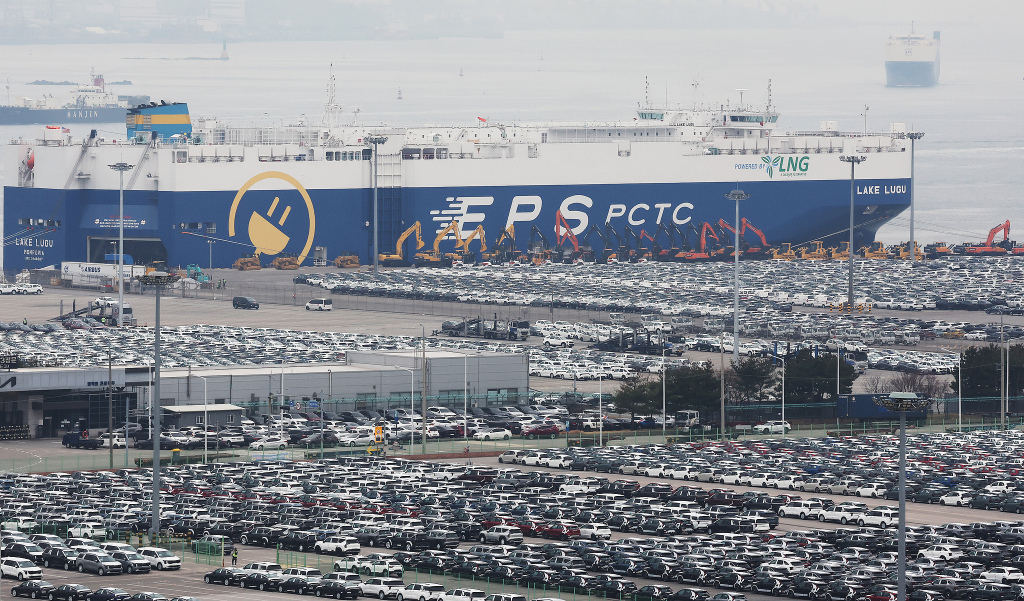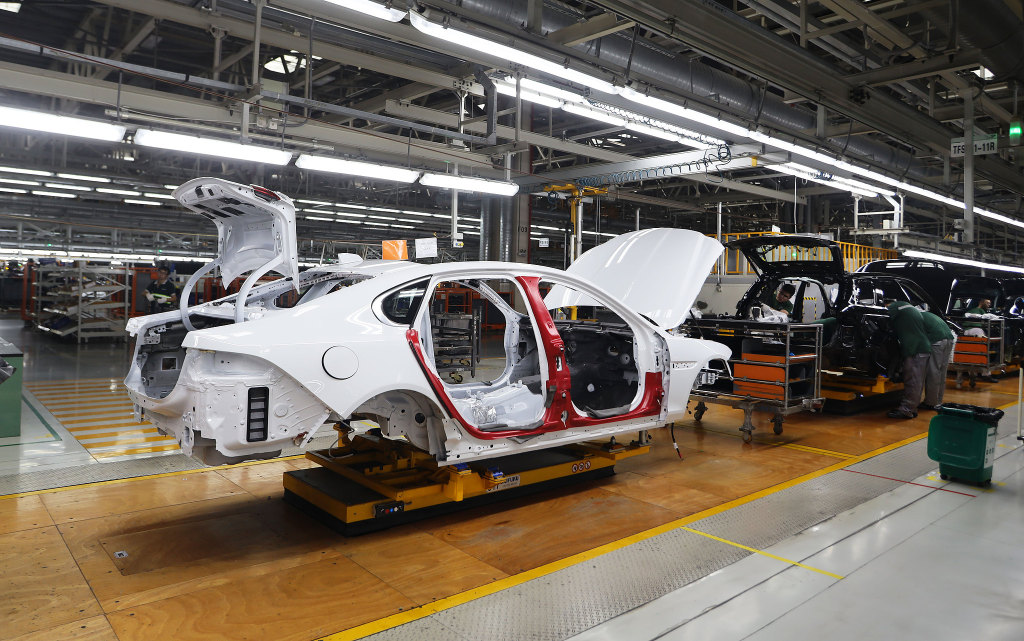
On April 2, local time, US President Trump announced a 25% tariff on imported cars, which officially took effect on April 3. As the world's second largest auto market, where imported car sales account for half of the total sales of 16 million vehicles in 2024, the United States has always been an important market and source of income for many multinational automakers. This "indiscriminate attack" by Trump affects not only non-US automakers, but also US automakers with a higher degree of localization.

On April 9, 2025, local time, at Pyeongtaek Port in Gyeonggi Province, South Korea, there was a stockpiling of cars because the US government announced on the 5th that it would impose mutual tariffs on more than 80 countries including South Korea from 0:01 local time on the 9th, causing a hoarding of cars.
From suspending deliveries to laying off employees and raising prices, overseas automakers are showing off their skills
Faced with a new round of "tariff war" policy by the United States, some multinational automakers have acted quite quickly.
On the day the policy took effect, Volkswagen quickly planned to add import fees to the sticker price of cars shipped to the U.S. A memo confirmed by a Volkswagen spokesman showed that the company informed U.S. dealers of the fee adjustments and took temporary measures to suspend rail shipments from Mexico and temporarily hold vehicles shipped from Europe at ports.
According to data from the German Federal Statistical Office, the United States accounts for 13.1% of Germany's automobile exports, making it the largest market for German automobile exports. Volkswagen's sales in North America account for about one-fifth of its total sales, and its North American deliveries in 2024 will increase by about 7%. In the first quarter of this year, Volkswagen sold about 87,900 vehicles in the United States, a year-on-year increase of 7.1%, but its sales in March fell by 7.6% year-on-year.
Audi, a subsidiary of Volkswagen, has also decided to suspend the delivery of new cars to US dealers. It is reported that Audi said in a letter to dealers that all vehicles shipped to the United States after April 2 will be temporarily detained and will not be handed over to dealers, and "dealers should now focus on reducing inventory." This information has been confirmed by an Audi spokesman, who also said that Audi currently has more than 37,000 cars available for sale in the United States that are not affected by the new tariffs, which can meet market demand for about two months.
It is understood that Audi's sales in the United States in 2024 will be 196,600 vehicles, a year-on-year decrease of 14%. The decline in US performance has also affected the revenue and profits of the Audi Group. Last year, its total revenue was 64.532 billion euros, a year-on-year decrease of 7.6%, while its operating profit was 3.9 billion euros, a year-on-year decrease of 37.8%. It is reported that Audi is also considering raising the price of its models in the United States to offset the impact of tariffs.
Jaguar Land Rover also responded to the US tariff policy by suspending its car exports to the US for one month starting from April 7. At the same time, in order to ensure the normal sales of the brand, Jaguar Land Rover has stockpiled two months of inventory in the US before the tariff policy came into effect.
However, these measures are only stopgap measures and cannot fundamentally solve the problem. Jaguar Land Rover is considering taking measures such as raising prices in the United States, reducing costs, and turning to other markets to cope with the impact of tariffs. Previously, Jaguar Land Rover exported about 100,000 vehicles to the United States each year, accounting for about 25% of its global sales. The decline in sales in the US market will be a heavy blow to Jaguar Land Rover.
In addition to the above-mentioned companies, some other multinational automakers are also trying their best to deal with the tariff policy. Mercedes-Benz is considering withdrawing its entry-level cars from the United States, while Porsche and Aston Martin are preparing to increase the prices of their models in the United States. Ferrari has already announced a 10% price increase in the United States.
Trump once said in an interview that he "doesn't care" about automakers raising prices due to tariffs. He said that permanent tariffs on foreign-made cars will promote the development of American factories and believe that this move will increase sales of American-made cars. Trump also said that he hopes automakers will raise prices because if they raise prices, people will buy American-made cars.
Production costs and sales prices continue to rise, but local car companies are not really benefiting
Although on the surface, Trump's policy of imposing a 25% tariff on imported cars will not have a direct impact on US domestic automakers (GM, Ford, Tesla, etc.), as participants in the global supply chain, US domestic automakers cannot remain immune.
According to the U.S. Census Bureau, nearly 60% of the parts of cars assembled in the United States in 2024 came from foreign countries, and the total import value of cars, parts and engines reached a record high of $474.3 billion. In particular, Canada and Mexico, both in North America, are important parts and vehicle production bases for many American automakers. The tariff policy has also forced American automakers to adjust their production layout.
Take Stellantis, which owns several domestic brands in the United States, such as Chrysler and JEEP. The automaker previously announced that it would temporarily lay off 900 employees at its five U.S. factories and temporarily close two assembly plants in Canada and Mexico. Since its North American supply chain is highly dependent on Mexican factories, the new tariffs will increase the cost of each vehicle by about $4,200.
GM also has factories in Canada and Mexico. Analysts estimate that about 49% of its cars sold in the U.S. are imported, especially large pickup trucks with large sales and profits, about half of which are produced in factories in Canada and Mexico. In the face of tariffs, GM has hired hundreds of temporary employees for its plant in Fort Wayne, Indiana, calling it an "operational adjustment to meet current production and business needs." In addition, Dennys Pimenta, director of GM's Fort Wayne plant, revealed in a live broadcast that the company may also arrange overtime to increase production capacity.
Ford, which has a large production scale in the United States, may be the least affected among the three traditional American automakers. About 80% of its cars sold in the United States are produced in the United States, and most of Ford's sales also come from the United States. However, it cannot be ignored that most of the parts for Ford's models produced in the United States come from overseas, especially because it has a considerable number of parts suppliers in the United States and Mexico. If the supply of these parts is interrupted, Ford's vehicle assembly efficiency will also be greatly reduced.
As for Tesla, the leader in the US electric vehicle market, 65% of its parts rely on overseas suppliers. For example, core auto parts such as lithium batteries, lithium battery materials, die-castings, and interior parts still need to be imported from China, and it is impossible to find alternative suppliers in the United States that meet the production capacity, quality, and efficiency requirements in a short period of time. Therefore, Tesla's sales and stock prices in the United States have declined significantly recently.
Perhaps because of the fear that the new tariff policy will bring about price increases, the U.S. auto market saw a significant increase in the first quarter, with passenger car sales increasing 4.8% year-on-year to 3.858 million units. This is the first time since 2021 that sales in the same period have surged to more than 3.8 million units, and most automakers have also reaped the rewards.
However, such a "grand occasion" is unlikely to continue. John Murphy, an analyst at Bank of America, said that if automakers pass on all the costs of the 25% tariff to consumers, new car sales in the United States this year will fall by about 20%. Even if they only pass on the costs to break even, the sales loss will be around 15%.
Trump once said that high tariffs would prompt companies to move their manufacturing operations back to the United States. However, supply chain reconstruction is not easy. This process will take years and hundreds of billions of dollars. The American Automotive Policy Committee pointed out that the integrated supply chain in North America has been formed over decades, and forced separation will lead to a permanent increase in production costs. Cox Automotive predicts that the wholesale price of new cars in the United States will increase by 2.8% year-on-year in 2025. Black Book expects the average transaction price of new cars in the United States to rise by 5% this year. Morgan Stanley also said that tariffs will increase the average price of cars by 11% or 12%.
In the long run, Trump’s new tariff policy will hardly achieve the prosperity goal of “manufacturing repatriation”, and the rising costs will further weaken the global competitiveness of the US auto industry.


